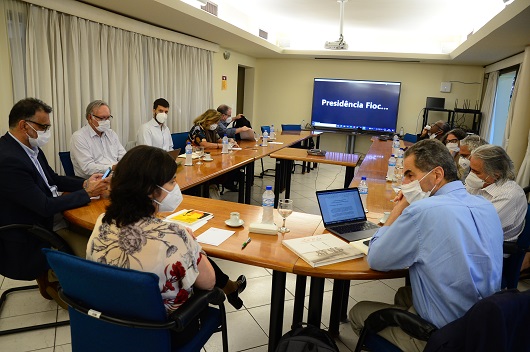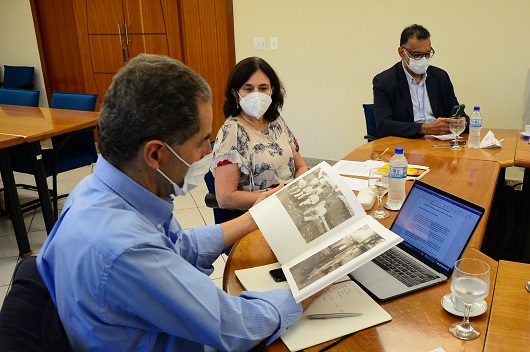Former Portuguese minister of Science and Technology visits Fiocruz
10/06/2022
Cristina Azevedo (Fiocruz News Agency)
An influent figure in the field of science, technology and innovation, and former Portuguese minister, Manuel Heitor visited Fiocruz last Tuesday, June 7. The professor at the Superior Technical Institute of the University of Lisbon came with two missions: to further expand a collaborative laboratory program that Portuguese institutions already have with the Foundation and to look for new areas for collaboration. By the end of the visit, new suggestions for collaborations came up.
Ex-minister Manuel Heitor was welcomed by the Fiocruz president, Nísia Trindade Lima (image: Peter Ilicciev)
Manuel Heitor’s visit to Fiocruz took place a month after the Foundation’s president, Nísia Trindade Lima, visited Portugal. Heitor was the Portuguese minister of Science, Technology and Higher Education between 2015 and the beginning of this year. He was the one who invited Fiocruz, via the Molecular Institute of Biology of Paraná (IBMP), to become a member of the 4LifeLAB, a collaborative laboratory for knowledge and new technologies for health. After a visit to the COVID-19 Diagnostic Support Unit (Unadig), the former minister met with Lima and with other members of Fiocruz at the Official Residence.
“The trip to Portugal was important to see how the country is organizing this process of thinking about recovery and resilience, with a strong focus on science, technology, and innovation”, said Nísia. “The work done by the collaborative laboratories is inspiring”, she added. The president said the COVID-19 pandemic ended up bringing Fiocruz closer to Portuguese institutions, such as the Center for Engineering and Development (CEiiA), one of the partners of the 4LifeLAB, which she visited in Matosinhos last May.
Integrated work
The former minister said that while he was a member of the Portuguese government and as such launched the idea of collaborative laboratories that strive for technological development in several fields, the goal was precisely to understand the needs of different communities, to bring together public and private partners, and to offer concrete responses. In this case, one of the necessities was helmets to protect doctors and technicians from COVID-19, as well as pulmonary ventilators for patients, both developed by the CeiiA.
At Fiocruz, the ex-minister was able to know more about the Foundation's work (image: Peter Ilicciev)
Impressed with the visit to the Maré community the previous day, Manuel Heitor suggested the creation of a new collaborative center to address the issue of safety for locals: not only public, but also food, environmental, health, and even labor-related. At the Fiocruz meeting, he learned a bit more about the project developed by the Foundation in this community, a work that brought together COVID-19 vaccine research, telemedicine and support actions, working with local organizations.
“I usually say that we work with the communities, and not for the communities”, said Nísia, adding that Fiocruz also develops projects with indigenous and quilombola populations, and with other vulnerable groups. “We are fully interested in working on projects with an integrated vision”, she added, highlighting Foundation’s interest in educating and training professionals.
Another suggestion posed by the former minister was a collaboration on the environmental issue through the Atlantic International Research Centre (Air Centre), which proposes an integrated approach involving space, climate, oceans, and energy. He was also able to learn a bit more about the Foundation’s initiatives regarding the environment.
Pedro Barbosa, IBMP director, said that one of the ongoing projects within the 4LifeLAB is a bracelet to monitor patients using the Manchester protocol. Mario Moreira, vice-president of Institutional Development and Management, showed interest in knowing more about other collaborative laboratories that exist in Portugal and that work with areas such as the investigation of chronic diseases. This could lead to new partnerships.
“Fiocruz is a world-level reference. Nísia’s visit to Portugal was particularly significant. Here we further discussed a collaborative laboratory that already exists, but new ideas have come up as well. I believe we have much work ahead of us”, said Manuel Heitor. “Collaborative laboratories were developed in a European context, in Portugal, but I believe they can be very interesting for Brazil, especially in the context of Rio de Janeiro”.
The ex-minister received a book about Oswaldo Cruz's scientific trips (image: Peter Ilicciev)
Nísia received from Manuel Heitor a poetry book about Portuguese singer Amália Rodrigues, and gave him a book on the collection resulting from Oswaldo Cruz’s scientific trips early in the 20th century in return. The meeting at the Official Residence was also attended by Paulo Gadelha, coordinator of the Fiocruz Strategy for the 2030 Agenda; Valcler Rangel, coordinator of Institutional Relations; Carlos Gadelha, coordinator of Fiocruz’s Center for Strategic Studies (CEE); Valber Frutuoso, advisor for the President’s Office; Cristina Guilam, pro-dean of Education at VPEIC; Pedro Burger, vice-coordinator of Fiocruz Global Health Centre (Cris/Fiocruz); and Ilka Vilardo, Cris advisor.



